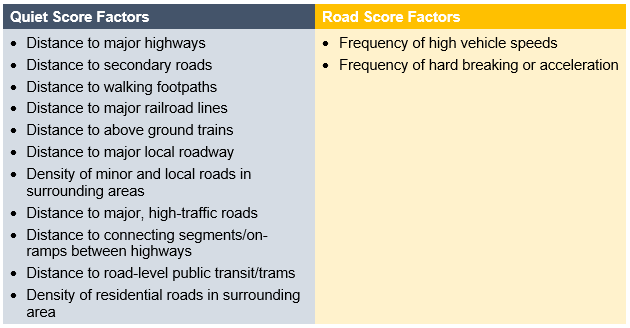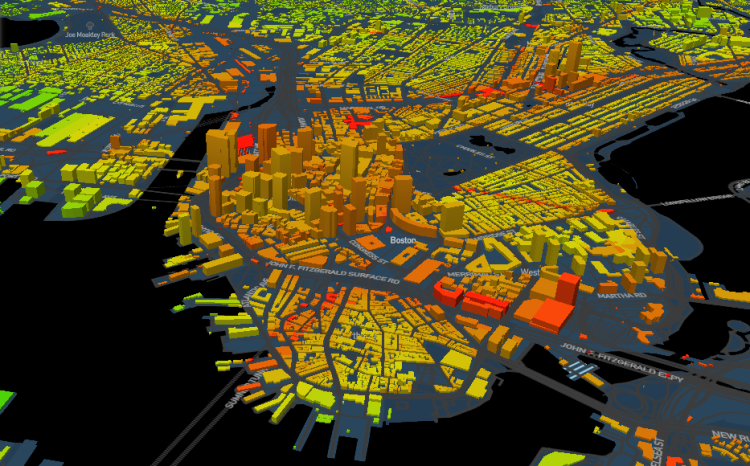
Liberty Mutual’s Solaria Labs display at the Hubweek Hub in Government Center
Last Saturday at the Hubweek Hub, a map of Boston illuminated a large display. Evoking a figure ground, it showed a variety of colors and the confident name: Total Home Score (THS). I finished waiting in line for the STAT 360° virtual reality experience and then headed to the next shipping container to check out Solaria Labs‘ THS display.
Solaria Labs (also on Twitter and LinkedIn) is the two-year-old venture by the 105-year-old, Boston-based multinational Liberty Mutual. The international insurance company launched Solaria to embrace the tech start-up world. Solaria employees even share a WeWork space rather than share space in its parent’s Back Bay building.
THS is Solaria’s latest venture–just one week old as of Hubweek. The product aims to help “home buyers and realtors understand the complete value of a home,” although it also includes public and commercial addresses and would likely be helpful for renters too. Solaria seeks to accomplish this goal by generating a pair of scores (maybe the name should be plural?): Quiet Score and Road Score.
The Road Score appears to come from RightTrack, a Liberty Mutual program and device that monitors your driving habits for the opportunity to earn a discount on your car insurance. These and geospatial data on roads, rails, and footpaths populate a set of factors that the Solaria algorithm uses to calculate the THS:

Noise and Road Score Factors. The List may be incomplete and was derived from selecting addresses at random.
The weight of any single factor (i.e., minor, moderate, and major) changes depending on the specific address, and usually only a few factors are present for any given address. Every address starts with a score of 100, but the presences of a Noise or Road factor decrease the starting value depending on the weight (e.g., a major factor is worth 20+ points).
On the THS webpage, you can either plugin an address or select one of the 3D buildings from the colorful map. The map is fun to poke around with as you can switch between the Quiet and Road scores to display a red to green gradient, with redder colors indicating a worse score and greener colors showing a better one. Fun aside, an option to switch to a 2D version of the map might be helpful since it would reduce rendering and load times.
Currently, THS is only available in Boston and 20 cities and towns in its immediate suburbs.* My parents’ house in Ashland is outside the boundary, so I plugged-in my brother’s in the South End. His address scored 50 or Average on both counts. This result is not entirely surprising as the extra-wide Washington Street is nearby and I-93 is not too far away.
Still, his home faces a park, which casts some doubt on its early real-world reliability. I have not witnessed dangerous speeding on the side street outside his door and the mature trees help absorb the noise from Washington, despite the occasional rowdy bike party. Solaria might be able to account for this reality by adding proximity to greenspace to the Quiet Score factors.

Screenshot of the Solaria Lab’s Quiet Score map for the Shawmut Peninsula
Final Thoughts on Total Home Score
THS is the latest in a number of products that attempt to quantify some aspect of the home experience. Walk Score, now owned by real estate company Redfin, launched in 2007 and has since expanded to 595 communities in the US, Canada, Australia, and New Zealand. The product gives a 0-100 rating based on destinations within a 30-minute walk. Today, the site also displays a companion Transit Score and Bike Score. My brother’s South End address is a Walker’s Paradise (94), has Excellent Transit (89), and is Very Bikeable (87).
Last month, DC-based TransitScreen launched MobilityScore, which also gives a 0-100 rating. In this case, the rating measures options to get around other than by your own car, covering Ridehailing (e.g., Uber), Public Transit, Bike Share, and Car Share (e.g., ZipCar). MobilityScore now covers the 30 largest US metropolitan areas and 5 biggest Canadian ones. Notably, the score updates in real-time based on which services are available. On a Tuesday afternoon, my brother’s address does well, scoring a 71 for “good mobility.” True Bus-Rapid Transit on the Silver Line would surely bump up that number.
Compared to these other products, THS is still a pipsqueak. However, each serves a different niche and the backing of a $39 billion insurer could see THS scale quickly. For their part, Solaria staff at HubWeek said that they are looking to add new factors and scores to the platform as they continue to roll out the product. Accounting for different Road and Quiet Scores throughout the day, similar to MobilityScore, might be another worthwhile avenue to explore. What do you think?
*The 20 other THS communities besides Boston are: Arlington, Belmont, Braintree, Brookline, Cambridge, Chelsea, Dedham, Everett, Hingham, Hull, Malden, Medford, Milton, Newtown, Revere, Somerville, Watertown, Weymouth, Winthrop, and Quincy.
Discussion
No comments yet.